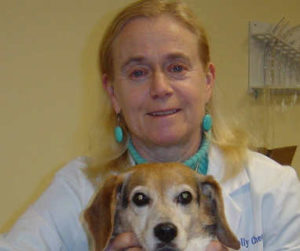The Vet is In:
Changing Seasons: Make Sure Your Animals Are Ready for Winter
As the summer wanes with autumn right around the corner, it is not too early to consider whether you and your pets are ready for the next season’s issues impacting your companions’ health.

- Has your dog or cat had his/her annual examination, which is easier to manage (for many of us) in good weather?
- External parasite control: fleas and ticks can persist right up to the first series of frosts, so keep using anti-tick and flea medication, oral or topical, until there is a sufficient number of killing frosts to eliminate the unwanted pests that can cause a range of illnesses.
- As for heartworm prevention, the American Heartworm Association recommends that you give the preventative medication once monthly, year-round.
- If you travel on holiday or seasonal trips with your pets, be sure that you have copies of their proof of Rabies vaccination.
- Speaking of travel…we know that the global climate change effects thus far have caused an increase in the frequency and severity of storms. Shelters in vulnerable areas have already had to handle an increased volume of animals seeking safety in stormy weather. If you live where flooding, hurricane, or tornado damage is possible, we recommend that you have an escape plan and a travel pack ready to go when needed. The contents should include: collar, harness, leash, vaccine status, a few meals’ worth of food, and any medications needed.
- If your companion has not been microchipped, NYSHA recommends that you consider doing so: in emergency situations such as extreme weather destruction, shelters may need to move their occupants, and pets do become lost in disasters. A microchip may make all the difference between recovering your beloved companion and permanent loss.
- Since dogs tend to be more sedentary when we all spend more time indoors, be sure to have an exercise regime for them and make sure their weight is controlled by a healthy diet.
Please spread the word!
 Holly Cheever, DVM
Holly Cheever, DVM
NYSHA’s VP, Dr. Holly Cheever, is a partner in a small animal practice, the Village Animal Clinic, in Voorheesville, NY. She sits on several boards for animal issues, is a speaker and consultant across the nation, and has testified before Congress about animal abuse in circuses, as well as in New York City regarding the carriage horse trade.
New York State Humane Association Humane Review, Vol.XXXIV, Fall 2019.